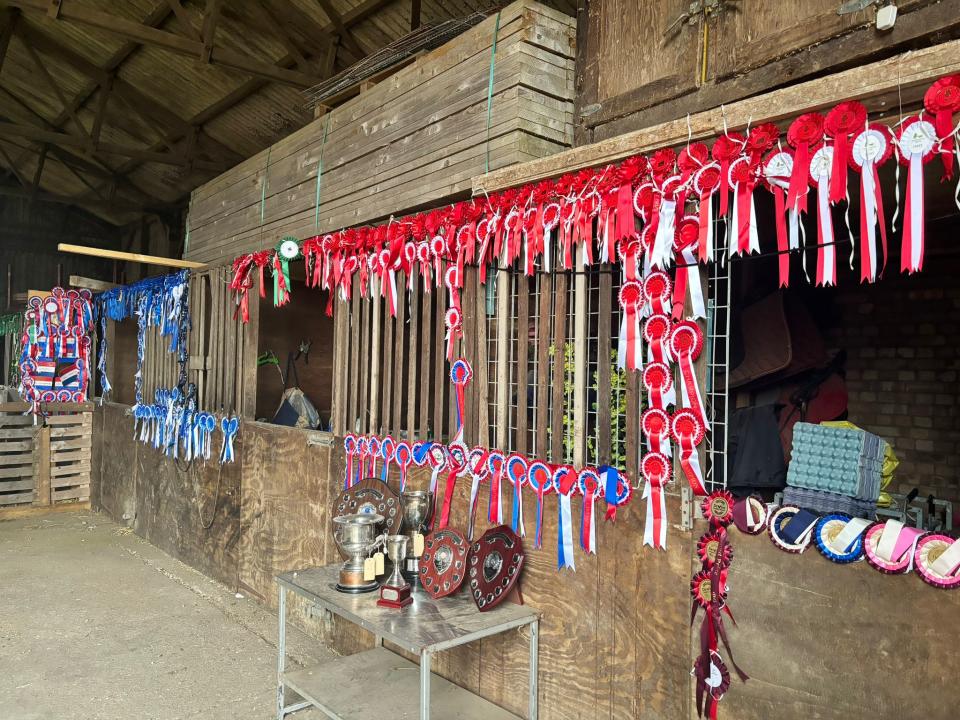British Sheep Farmer’s Wool Burning Practice Isn’t the ‘Protest’ It’s Made Out to Be

One farmer’s practice of burning the wool shaved off her sheep has churned up “shear” madness, as media outlets like the BBC have reported she did so to protest ultra-low wool prices paid out to farmers in England. But where there’s smoke, there’s not always fire.
Jade Bett, who describes herself as a “hobby farmer” in Lincolnshire, England, raises sheep on the farm she shares with her husband, Richard. Though Bett said she and her spouse do burn the wool fleeces sheared from their sheep, the practice is not an act of defiance.
More from Sourcing Journal
“It wasn’t a protest—or we haven’t deliberately decided to take a stand against it,” Bett told Sourcing Journal. “It’s just that it’s really not in our interest to do anything other than burning it, financially. We know [shearing] is something that’s got to be done every year, but we’ve never gone into sheep thinking, ‘Oh, we can get a secondary revenue from the value of wool.’ We’ve always known it’s been worthless, really.”
Bett said she and her husband Richard own about 260 pedigree sheep, which they show at various competitions throughout England. They have never sold the wool fleeces sheared off of them annually.
“We’ve always burnt it,” she said, adding that the Betts have had sheep for eight years.
That’s because, per Bett, they would only get about 26 British pence (33 cents) for each kilogram of wool. But the cost to shear and transport the wool to the closest depot, nearly an hour away from the Betts’ farm, she said, means that a mere 26 pence isn’t worth the trouble.
“We pay about 3 pounds ($3.77) per sheep to be sheared, and it would cost us between 25 and 30 pence (31 to 38 cents) per fleece to haul it to our local depot. So, [spending] somewhere in the region of 3.30 pounds ($4.15) to get 26 pence back is crazy; I don’t understand why anyone would do that,” Bett said.

Bett noted that other farmers, who raise thousands of sheep, sometimes have deals with their shearers to haul away the fleeces. She said those farmers “might get [shearing services] slightly cheaper if they’re prepared to let the shearers take the wool,” since the shearers can then sell the fleeces in mass quantities.
But because Bett has fewer sheep than commercial farmers would, and because she lives in a rural area of England that doesn’t focus on raising sheep, the shearers don’t want to spend the time to haul her fleeces.
“We’re in Lincolnshire, and Lincolnshire isn’t a sheep county, particularly—it’s mainly arable crops and things.…We haven’t got any big gangs of shearers, and we can’t piggyback onto local farmers that have got 3,000 or 4,000 sheep,” Bett explained.
Bett said she knows many other farmers also burn their fleeces instead of making the trek to depots to sell them.
“I’m sure [the depots] would be horrified to know the amount of farmers that burn their wool, because obviously every fleece that is burned is a fleece less that they’re able to sell and probably profit from,” she said.
The hobbyist said she would consider selling the wool if the price farmers received for it increased to “anything toward 4, 5 or 6 pounds” ($5.02-$7.54) per kilogram.
“I think farmers would be ecstatic—that would cover their cost of having their sheep sheared [and] the haulage cost, and they might make 50 pence a fleece,” she told Sourcing Journal. “Would wool ever become that valuable? Would it ever get to 6 pounds? That just seems like a thing of dreams. I can’t imagine it; I can’t imagine the government ever being able to get everyone together and get everyone to pay that kind of price for it.”

To enact change and drive up the price farmers would receive for wool, organizations like the National Sheep Association and the British Wool Board would need to come together and make a plan, Bett explained.
Phil Stocker, the National Sheep Association’s chief executive, said wool prices could soon increase.
“The majority of our members would like to see more of a return for their wool clip, but the rise of synthetic fibers has made food production a priority over fiber. We are aware that a small number of farmers who burn or bury their wool, but even if there is little cash value, we would encourage all farmers to think about using it in other ways on the farm, either as a weed suppressing mulch or as a soil conditioner,” Stocker said. “Prices are heading back in the right direction, and the UK still has an output of more than 22,000 tons of wool each year, but we need more support from the general public to value wool and see it as the sustainable, climate-smart product it is.”
British Wool said it will continue working to create wool demand for its members across the UK.
“British Wool works to drive demand for wool to maximise the returns for its members. Demand for British wool is growing and prices have increased over recent months. This is encouraging and will support returns to members but for the majority of sheep farmers the value of their wool will still not cover the cost of shearing,” a spokesperson for British Wool said. “We urge manufacturers and consumers to support UK sheep farmers by specifying British Wool in the products they make and buy.”
Until or unless those institutions further band together to increase wool prices or collection processes enough to make it worth Bett’s while, she said, she has a newfound use for her fleeces once shearing season comes in April.
“From [this story] going out, locally, I’ve got a couple of contacts from people like the Lincolnshire Spinners. They’re a group of gray-haired ladies that are desperate to get hold of raw wool, and they knit blankets and things like that,” she explained. “We’ll donate it—I’d just like someone to do something with it, so that’s probably going to happen this year.”
Solve the daily Crossword

